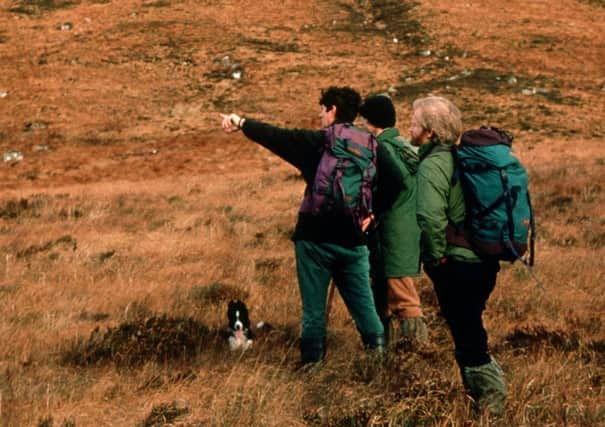Leaders: Conservation versus right to roam


Among those provoked is the Mountaineering Council of Scotland, which argues that the suggestion runs counter to the spirit of co-operation between ramblers and landowners now well established in Scotland. The mountaineers may have a point, but there is a long history of antagonism between them and gamekeepers.
The right of responsible access, which became law in 2003, has worked well in most parts of Scotland. Landowners generally appreciate that those who roam their land are there to enjoy it, not to damage it. Ramblers also understand that the land they walk over also, in many cases, provides a living and therefore that restricted access at times of, say, lambing, is appropriate.
Advertisement
Hide AdAdvertisement
Hide AdOf course, there are exceptions on both sides, but not enough to disprove the case for responsible access. But with more people exercising their right to countryside access, now estimated to number 230,000 per month, is there a growing conservation case for restrictions?
There have already been quite a few introduced for exactly that reason. The sight of ospreys is increasingly common, but only because people are forbidden from getting too close to their nesting sites. The number of boats and people viewing dolphins in the Moray Firth has been curbed because of fears that too much traffic was damaging the creatures.
So there may be a case for further restrictions. But it does not look at all convincing, especially as it is not being mooted by a wildlife conservation body, but by a gamekeepers’ representative. Gamekeepers do not have a great conservation track record, and some within their ranks are occasionally found responsible for poisoning, trapping and destroying the nests of birds of prey.
Landowners have some black sheep among their ranks as well. The concentrations of these kinds of wildlife crimes suggest that some landowners, anxious to preserve game bird populations, are complicit in this illegal slaughter.
Indeed, there are still a few recalcitrant landowners with out-dated attitudes that the land they own is private and that they are entitled, by the locking of gates and the installation of forbidding fencing, to keep people out simply for the purpose of their estate being their sole preserve.
Because of suspicions these attitudes still prevail, Mr Hogg’s suggestion is not likely to go far. But if there are genuine arguments to be made about particular sites and wildlife species, let them be made. If the evidence that access should be limited is strong, then reasonable compromises can be reached, as they have been for ospreys and dolphins.
Austerity not so bad after all
Austerity, it was always clear, would mean big cuts in welfare spending. The Scottish Government has now estimated what this means for Scotland – a cumulative reduction over the six years between 2009-10 and 2015-16 of about £6 billion.
It sounds frightening, and doubtless will be presented as such by SNP ministers. But it is also misleading. Cumulative figures serve only political purposes; to know how people might be affected, annual figures are a more realistic guide.
Advertisement
Hide AdAdvertisement
Hide AdAnnual spending on welfare in 2015-16 will not be £6bn lower than six years previously, but about £2.3bn lower. And with a third of the cuts already made, the annual Scottish welfare bill – £14.6bn in 2012-13 – is expected to fall to £12.7bn.
It is still a stiff 13 per cent cut. But whether this means that there will be a real fall in individual incomes depends on circumstances. Pensioners will not be affected as the cuts will fall mainly on low-income households, for example by limiting increases in working-age benefits and tax credits to 1 per cent for three years from 2013-14.
Neither is it the case that all that is happening rests with the UK government. When recession hits, welfare bills rise because of rising unemployment; when recovery takes hold, welfare bills fall. It is the case that real wages have continued to fall since the recession came to an end, but now there are strong signs that they are starting to rise again.
This, and the fact that the recovery is moving many people from part-time to full-time work, should reduce the demand for income support measures and other welfare payments. Austerity is not necessarily as dark as it is being painted.